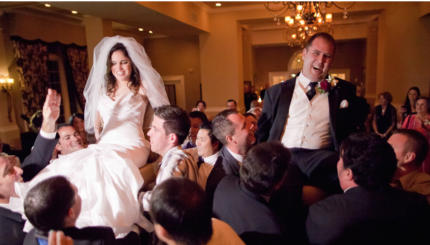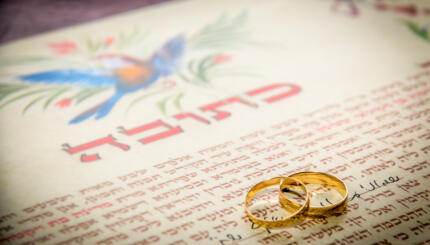The night before my wedding, as I was falling asleep, I realized that my fiance and I hadn’t discussed whether I would say anything under the chuppah, wedding canopy, in response to the pivotal words “Harei At Mekudeshet Li – Behold, you are consecrated to me.” During the months of planning, we had discussed and confirmed many moments where women were included and their voices heard… but we had just plumb forgot about that voice in that moment – my own.
Our wedding ceremony was Orthodox and feminist. Even though I sometimes struggle to describe myself with the terms “Orthodox” or “Modern Orthodox,” there is one permutation that I am always quick to confirm. I am a proud Orthodox feminist, and not shy about advocating for increased opportunities for women within the context of halakha, traditional Jewish law.
Weddings present an opportunity for women to be active participants in a public and ritual setting; depending on where you’re coming from, this may or may not sound like an innovation. By fully integrating your female family members and friends – and, of course, the bride – you ultimately honor not just them, but everyone there. A feminist wedding models values of inclusion for an entire community; or as the saying goes: a rising tide lifts all boats.
Whether you’re tying the knot soon, are thinking about it, or are just curious, listed below are some ways to ensure that women are major players in the wedding ceremony. The list is by no means exhaustive, nor will every suggestion be the perfect fit for every couple in every community.
These suggestions do represent, however, the kavanah or intention that people of all genders be seen and heard, included and honored:
Space and Pace – There are a lot of moving parts to a Jewish wedding, and with that comes many opportunities for women to lead and facilitate. In this role, one can create sacred space while also setting the logistical pace.
Examples: Leading a “kallah’s tisch” – before the wedding ceremony, facilitating songs and words of Torah and toasts to the bride; Singing traditional songs like “mi adir” or “mi ban tsiach” during the wedding procession and the circling under the chuppah; Facilitating and emceeing the transitions between all the different parts of the ceremony.
Honoring Friends and Family – In many Orthodox weddings, most or all of the kibbudim – ritual honors – are given to men who are close to the couple. This is due to the halakhic requirements and restrictions involved in a wedding, and can result in a ceremony not publicly honoring a single female family member, friend, or mentor!
There are actually ample, visible ways in which one can honor their loved ones, regardless of gender, within a halakhic framework. When someone participates with a certain task or blessing, they are not only being honored – they also become partners in creating a joyous and meaningful day.
Examples: Reading or translating aloud the ketubah – marriage contract; Holding one of the four chuppah poles; Reciting a translation of one of the sheva brachot – the seven Hebrew blessings given to the couple; Acting as a guard alongside two men during yichud, the private time the bride and groom spend together immediately after the ceremony.
The Couple – The bride and groom are at the beginning of a journey, for which the wedding ceremony is a send-off and a blessing that their experience together be happy, holy, and a blessing to others. In this setting, the couple have a chance to publicly and equally share voice and power – setting a standard of inclusion within both their personal relationship and their larger community.
Examples: Signing the pre-nuptial agreement which protects women in case of divorce; The groom circling the bride in addition to the bride circling the groom under the chuppah; The bride responding to the groom’s marriage vow with her own words of agreement; Exchanging two rings; Both the bride and groom speaking under the chuppah – giving blessings to each other, perhaps, or sharing letters written for the other.
On the night when I suddenly realized that my fiance and I had forgotten to discuss my response under the chuppah, we were following the tradition of not seeing each other (or speaking to each other) immediately before the wedding. The next day – the day of the wedding – we coordinated what I would say, through middlemen and with our amazing mesader kiddushin, officiant – ensuring that both of our voices would be present under the chuppah.
I still struggle with labels of all sorts; ask me where I’m from, and I’ll give you my life story instead of a straight answer. But the reason that I’m so quick to describe my wedding as an Orthodox feminist wedding, and myself as an Orthodox feminist, is that those terms best reflect the meeting of my values, my community, my lifestyle, and my hopes for the future.
One of my dearest hopes is that the term Orthodox won’t actually need to be qualified with “feminist,” that feminism within the Orthodox community will always be a given, at all times – public and private, sacred and mundane.
Register for Tuesday’s webinar for more tips for planning your Orthodox feminist wedding.
chuppah
Pronounced: KHOOP-uh or khoo-PAH, Origin: Hebrew, canopy under which a Jewish wedding ceremony takes place.
ketubah
Pronounced: kuh-TOO-buh, Origin: Hebrew, the Jewish wedding contract.
sheva brachot
Pronounced: SHEH-vuh bra-KHOTE, Origin: Hebrew, the seven blessings, which are traditionally recited as part of the Jewish wedding ceremony.
Torah
Pronunced: TORE-uh, Origin: Hebrew, the Five Books of Moses.



